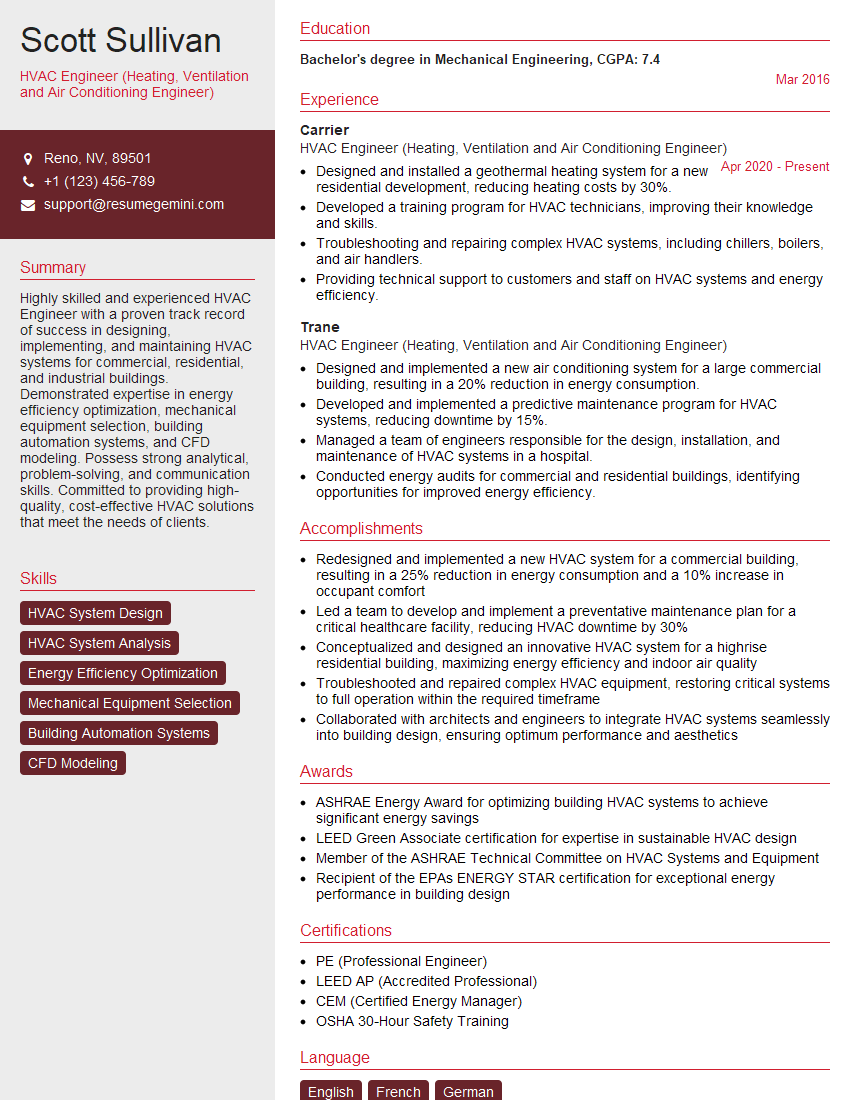Are you a seasoned HVAC Engineer (Heating, Ventilation and Air Conditioning Engineer) seeking a new career path? Discover our professionally built HVAC Engineer (Heating, Ventilation and Air Conditioning Engineer) Resume Template. This time-saving tool provides a solid foundation for your job search. Simply click “Edit Resume” to customize it with your unique experiences and achievements. Customize fonts and colors to match your personal style and increase your chances of landing your dream job. Explore more Resume Templates for additional options.

Scott Sullivan
HVAC Engineer (Heating, Ventilation and Air Conditioning Engineer)
Summary
Highly skilled and experienced HVAC Engineer with a proven track record of success in designing, implementing, and maintaining HVAC systems for commercial, residential, and industrial buildings. Demonstrated expertise in energy efficiency optimization, mechanical equipment selection, building automation systems, and CFD modeling. Possess strong analytical, problem-solving, and communication skills. Committed to providing high-quality, cost-effective HVAC solutions that meet the needs of clients.
Education
Bachelor’s degree in Mechanical Engineering
March 2016
Skills
- HVAC System Design
- HVAC System Analysis
- Energy Efficiency Optimization
- Mechanical Equipment Selection
- Building Automation Systems
- CFD Modeling
Work Experience
HVAC Engineer (Heating, Ventilation and Air Conditioning Engineer)
- Designed and installed a geothermal heating system for a new residential development, reducing heating costs by 30%.
- Developed a training program for HVAC technicians, improving their knowledge and skills.
- Troubleshooting and repairing complex HVAC systems, including chillers, boilers, and air handlers.
- Providing technical support to customers and staff on HVAC systems and energy efficiency.
HVAC Engineer (Heating, Ventilation and Air Conditioning Engineer)
- Designed and implemented a new air conditioning system for a large commercial building, resulting in a 20% reduction in energy consumption.
- Developed and implemented a predictive maintenance program for HVAC systems, reducing downtime by 15%.
- Managed a team of engineers responsible for the design, installation, and maintenance of HVAC systems in a hospital.
- Conducted energy audits for commercial and residential buildings, identifying opportunities for improved energy efficiency.
Accomplishments
- Redesigned and implemented a new HVAC system for a commercial building, resulting in a 25% reduction in energy consumption and a 10% increase in occupant comfort
- Led a team to develop and implement a preventative maintenance plan for a critical healthcare facility, reducing HVAC downtime by 30%
- Conceptualized and designed an innovative HVAC system for a highrise residential building, maximizing energy efficiency and indoor air quality
- Troubleshooted and repaired complex HVAC equipment, restoring critical systems to full operation within the required timeframe
- Collaborated with architects and engineers to integrate HVAC systems seamlessly into building design, ensuring optimum performance and aesthetics
Awards
- ASHRAE Energy Award for optimizing building HVAC systems to achieve significant energy savings
- LEED Green Associate certification for expertise in sustainable HVAC design
- Member of the ASHRAE Technical Committee on HVAC Systems and Equipment
- Recipient of the EPAs ENERGY STAR certification for exceptional energy performance in building design
Certificates
- PE (Professional Engineer)
- LEED AP (Accredited Professional)
- CEM (Certified Energy Manager)
- OSHA 30-Hour Safety Training
Career Expert Tips:
- Select the ideal resume template to showcase your professional experience effectively.
- Master the art of resume writing to highlight your unique qualifications and achievements.
- Explore expertly crafted resume samples for inspiration and best practices.
- Build your best resume for free this new year with ResumeGemini. Enjoy exclusive discounts on ATS optimized resume templates.
How To Write Resume For HVAC Engineer (Heating, Ventilation and Air Conditioning Engineer)
- Quantify your accomplishments with specific metrics and data to showcase your impact.
- Highlight your expertise in specialized areas such as energy efficiency optimization or building automation systems.
- Tailor your resume to each job description, emphasizing the skills and experience that are most relevant to the position.
- Proofread your resume carefully for any errors in grammar, spelling, or formatting.
Essential Experience Highlights for a Strong HVAC Engineer (Heating, Ventilation and Air Conditioning Engineer) Resume
- Design and implement HVAC systems for new and existing buildings, ensuring optimal indoor air quality, thermal comfort, and energy efficiency.
- Conduct energy audits and identify opportunities for improved energy efficiency in HVAC systems.
- Develop and implement predictive maintenance programs to minimize downtime and extend the lifespan of HVAC equipment.
- Manage and supervise a team of HVAC technicians and engineers.
- Troubleshoot and repair complex HVAC systems, including chillers, boilers, and air handlers.
- Provide technical support to customers and staff on HVAC systems and energy efficiency.
Frequently Asked Questions (FAQ’s) For HVAC Engineer (Heating, Ventilation and Air Conditioning Engineer)
What is the role of an HVAC Engineer?
An HVAC Engineer designs, installs, maintains, and repairs heating, ventilation, and air conditioning systems to ensure optimal indoor air quality, thermal comfort, and energy efficiency in buildings.
What are the qualifications to become an HVAC Engineer?
Typically, a bachelor’s degree in Mechanical Engineering or a related field is required. Relevant experience in HVAC design, installation, or maintenance is also highly valued.
What skills are essential for an HVAC Engineer?
Strong analytical, problem-solving, and communication skills are essential. Proficiency in HVAC system design software and knowledge of building codes and regulations are also important.
What are the career prospects for HVAC Engineers?
HVAC Engineers are in high demand due to the increasing focus on energy efficiency and sustainability in the construction industry. Career advancement opportunities include project management, consulting, and sales.
What are the key challenges faced by HVAC Engineers?
Designing and implementing HVAC systems that meet the specific needs of each building while adhering to energy efficiency standards can be challenging.
How can I stay updated on the latest trends in HVAC Engineering?
Attending industry conferences, reading technical journals, and obtaining professional certifications are effective ways to stay current with the latest advancements.